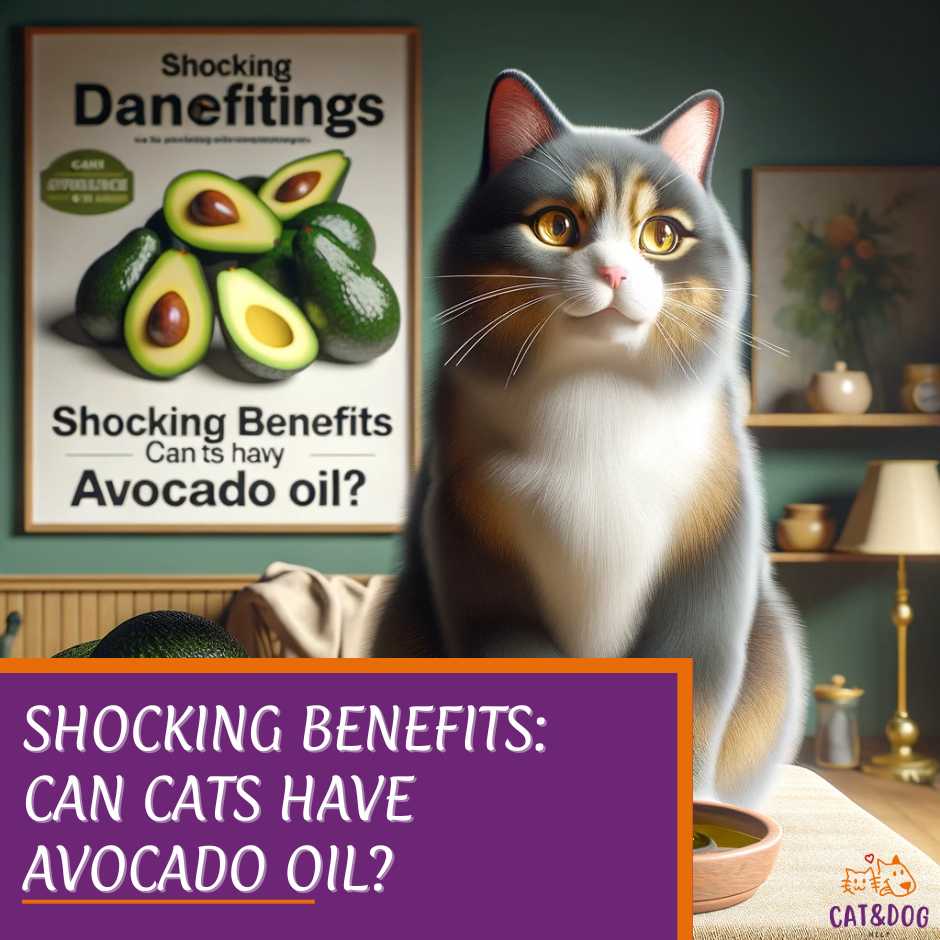As pet parents, we often want to share our healthy eating habits with our furry companions.
Avocado oil, a staple in the wellness community for its beneficial fats and nutrients, isn’t just for humans anymore—we’re looking into what’s good for our cats, too.
Have you ever wondered whether this trendy addition to your kitchen, such as avocado meal, can also be a beneficial supplement for your cat’s diet?
However, it’s recommended that you stick to cat food when deciding upon a diet for your cat because commercial cat foods, including cat food, will provide your pet with all the nutrients and vitamins they need.
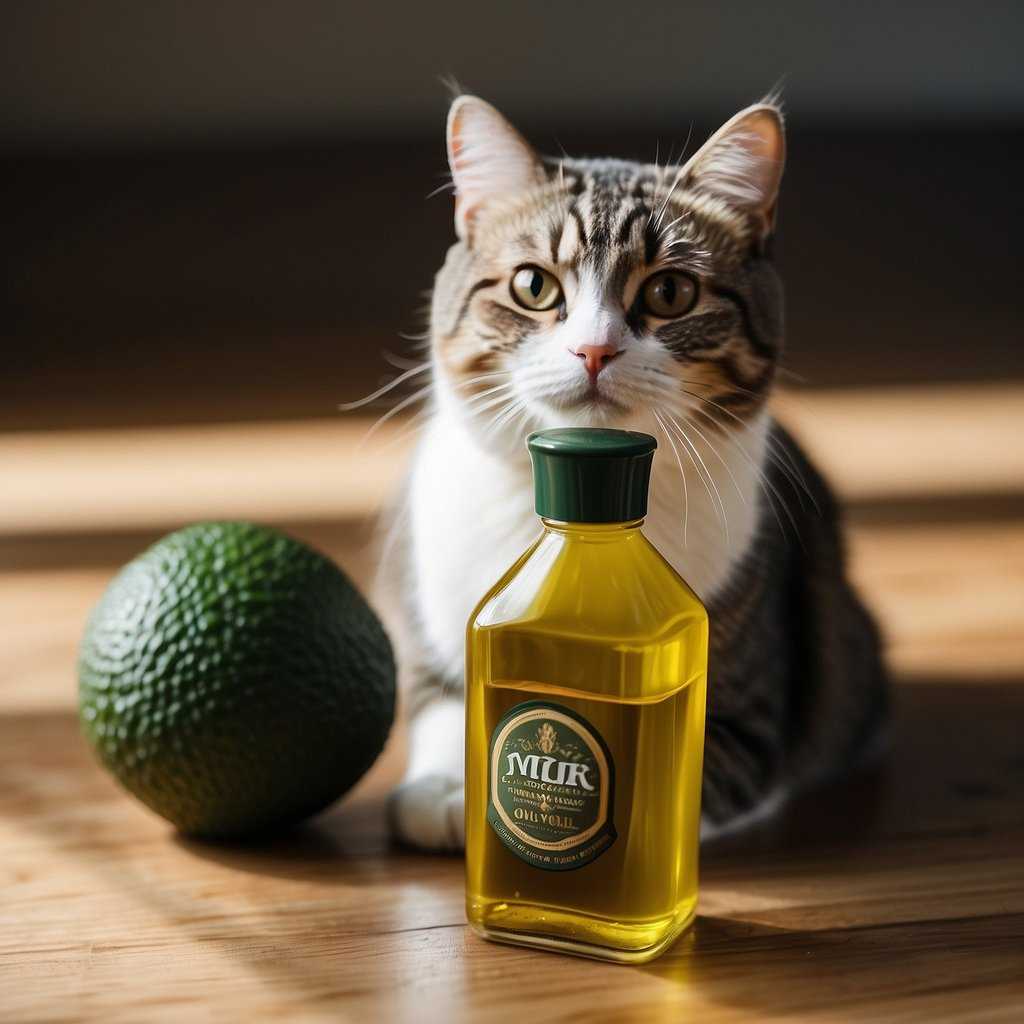
A little history lesson – avocado oil has been utilized in human diets for its health benefits, and its popularity has surged recently.
But when it comes to our whiskered friends, the question remains: can cats enjoy the same perks from avocado oil without any risks?
Let’s be real, safety is key, and we don’t want any tummy troubles like diarrhea, pancreatitis, or other gastrointestinal problems for our kitties.
While healthy fats are as good for cats as they are for us, it’s essential to get to the bottom of the avocado oil debate for their sake.
While exploring the benefits of avocado oil for your feline friend, remember that moderation is key, and it should complement a diet consisting of balanced, healthy cat treats specifically formulated to meet their nutritional needs.
Key Takeaways
- Avocado oil can be healthy for cats in moderation but must be given safely.
- Not all parts of the avocado are safe for cats; the flesh, skin, and pit should be avoided due to the presence of persin.
- Consultation with a vet is recommended before introducing avocado oil into your cat’s diet.
Can Cats Have Avocado Oil?
Have you ever wondered if that splash of avocado oil could cause your feline friend some trouble?
Well, while many consider it a health-boosting addition, let’s not overlook the potential hiccups. (1)
Allergic Reactions
Just like us, cats can have allergies too. Some signs that your kitty might not be taking well to avocado oil include:
- Itchy skin
- Hives
- Swelling
- Discomfort
No widespread case studies prove the frequency of these reactions in cats, but it’s always better to be safe than sorry, right?
Proper Dosage Guidelines
Now, you’ve probably heard the “moderation is key” mantra. It’s gold when it comes to avocado oil for cats, too.
The general guideline is a small dab’ll do ya for your kitty’s meal – think a teaspoon or less for your average-sized furball. But breeds and sizes vary, so let’s break it down:
- Small Cats (under 10 lbs): A couple of drops
- Medium Cats (10-15 lbs): About half a teaspoon
- Large Cats (over 15 lbs): Up to a teaspoon
Remember, each cat is unique, and what works for one might not work for another. It’s like picking out the purr-fect collar; what fits the sassy Siamese next door might not suit your chunky tabby.
So, before making avocado oil a regular guest at mealtimes, have a chat with your vet. They’re like the ultimate cat whisperers for health advice!
Keep things safe, keep things fun, and here’s to happy, healthy kitties.
Specific Information on Avocado Oil
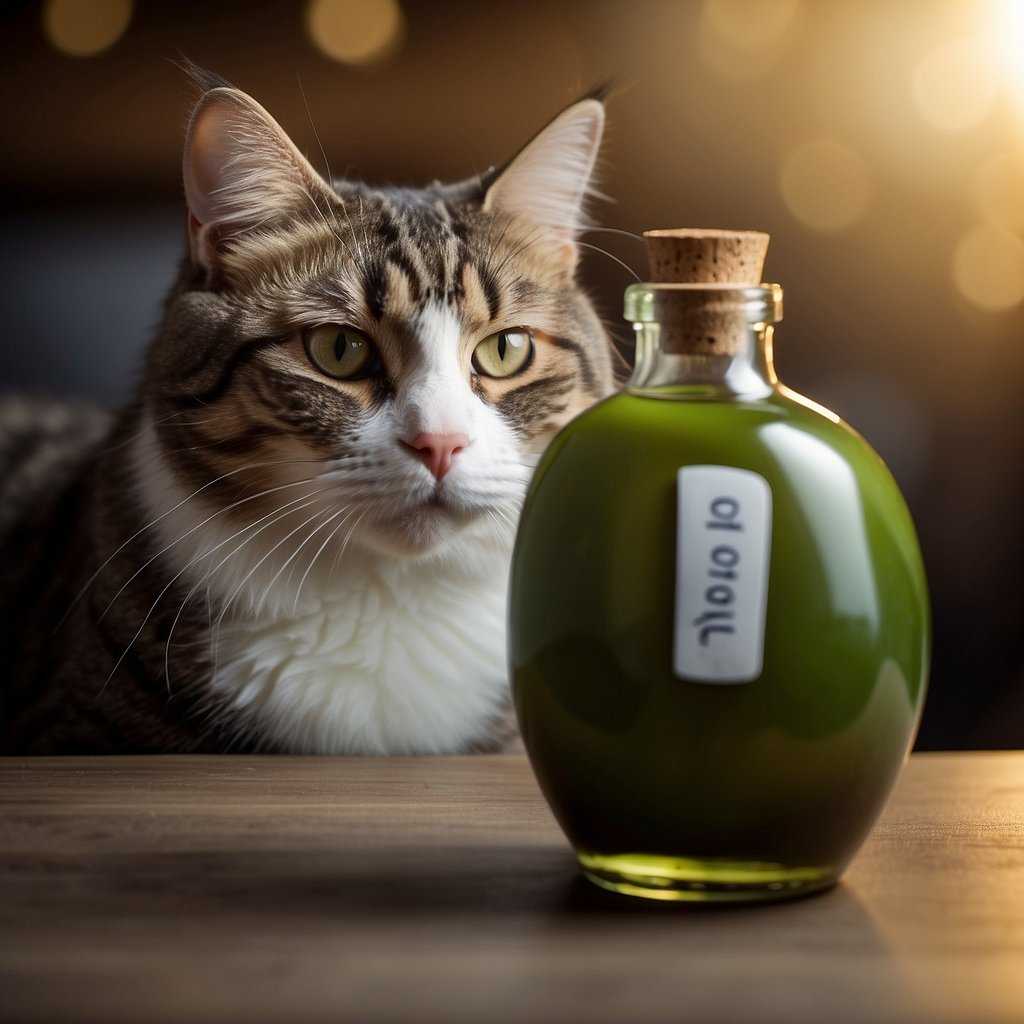
Have you been eyebrow-raising curious about whether it’s cool for your cat to take a little dip in avocado oil?
When considering the inclusion of avocado oil in your cat’s diet, prioritizing feline oil safety ensures that the dietary choice benefits your cat without risking their health.
Cats and avocados can seem like a mixing of two worlds, but let’s zero in on the oily business of avocado oil for your feline friends.
Fatty Acid Breakdown:
Let’s talk shop about what’s really in avocado oil. This oil is renowned for its monounsaturated fats – the good kind of fats that you’re probably giving yourself a pat on the back for choosing. (2)
But for cats, could these fats be the cat’s meow? They could potentially support various aspects of your cat’s health, such as their skin and coat condition.
- Monounsaturated Fats: Beneficial for skin and coat
- Polyunsaturated Fats: Also present, important for overall health (3)
Avocado Oil vs. Whole Avocado:
Ever been stumped at the fruit aisle, wondering if the oil or the whole avocado is the better pick for your kitty?
Here’s the scoop: the actual avocado fruit contains persin, an organic compound, which in large amounts isn’t your cat’s cup of tea and can be toxic. (4)
However, the oil, which is processed and refined, typically contains much lower levels of persin. That’s a huge relief, isn’t it?
- Whole Avocado: Contains persin which can be harmful
- Avocado Oil: Lower levels of persin, safer for cats in moderation
Health Benefits:
When it comes to avocado oil, benefits might include a shiny coat and hydrated skin — think of it as a spa day in a bottle for your cat!
It’s also packing vitamins like A and E, and minerals that could strut their stuff in the name of kitty health — but always use moderation as your guiding star. (5)
Remember, before making your cat an avocado aficionado, a chat with the vet is a must. They’re the wise wizards of pet health and can give you the thumbs-up or the hold-up on new food additions.
Nutritional Benefits of Avocado Oil for Cats
Hey there, cat lovers! Have you ever wondered about what goes inside your feisty little friend’s diet?
Especially when it comes to avocado oil. Well, let’s unravel the goodness it can bring to your kitty’s bowl.
When we talk about fats, it’s not all bad, especially when it comes to essential fatty acids. These are crucial for your cat’s health and, guess what?
Avocado oil is chock-full of them, including amino acids! These include Omega-3 and Omega-6 fatty acids which play a vital role in maintaining a shiny coat and reducing inflammation. (6)
Now, you might think, “What about other oils?” Great question! Compared to some oils, avocado oil has a unique balance of these fatty acids which strives for that purrfect nutrition profile your cat needs.
Vitamins and Minerals, anyone? Avocado oil is like a mini-multivitamin:
- Vitamin E: A powerful antioxidant that supports your cat’s immune function. (7)
So, how do these benefits stack up against whole avocados? Well, it’s like comparing apples and oranges—or should we say, avocados and avocado oil?
The oil packs a concentrated punch of nutrients without the excess fiber and potential toxins found in the whole fruit.
Here’s a little fun tip: a 1/4 to 1/2 teaspoon of avocado oil daily could already be enough for your kitty. Just remember, moderation is key! And, always consult your vet first.
In conclusion, bringing avocado oil into your cat’s diet might just be the gloss to their coat and the zing to their step. Keep it balanced, and watch your feline friend thrive!
Expert and Veterinary Insights on Avocado Oil
Hey, curious cat owner! You’re likely here because a little someone with whiskers has caught your eye—or, more specifically, something in your kitchen has piqued their interest: avocado oil.
What Do Vets Say?
You may have heard that avocado oil is a “health trend” for us humans, but what about your feline friend?
Some vets like Dr. Ricky Walther suggest that while the flesh of avocado is generally safe for cats, other parts, including the oil, warrant caution.
And just to throw in a little catnip for thought, Dr. Lorie Huston warns that persin, a compound found in avocados, can be toxic to cats causing some unpleasant reactions, including pancreatitis and avocado toxicity.
According to the Pet Poison Helpline, avocados are classified as mildly toxic to cats, so it’s important to be cautious when considering avocado oil for your kitty companion’s diet.
Clinical Studies and Research
Now, you’re probably thinking: “But wait, I saw a thing saying avocado oil improves heart health in cats!” Did you?
Well, let’s not leap before we look.
Here’s the scoop—based on the evidence, while avocado oil might offer benefits like reducing blood pressure due to potassium content, there isn’t a one-size-fits-all answer to whether it’s good for all cats.
- Potassium Effects: Reduces blood pressure.
- Digestive Benefits: May alleviate constipation.
However, bear in mind that these benefits have not been universally endorsed. Without more cat-centric research, it’s best to consider these points as potential benefits but not guaranteed results.
Remember, every cat is unique—just like their human! Before adding anything new to their diet, it’s wise to chat with your vet, especially if your furry friend has a history of gastritis.
They’ll have the latest tail—I mean, tale—and can provide personalized advice for your feline friend’s nutritional needs. So, keep those paws off the avocado oil until you’ve got the go-ahead from a pro!
Practical Guidelines for Avocado Oil
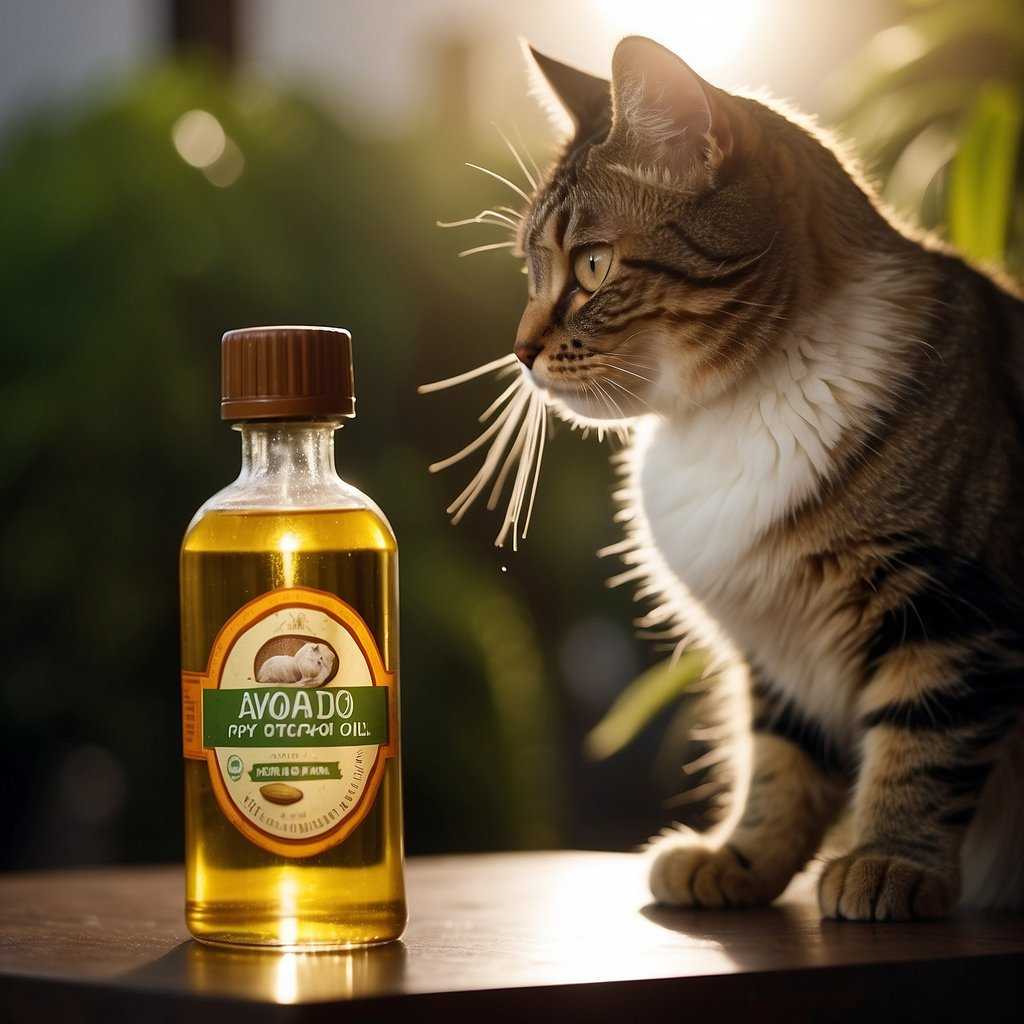
Hey there, are you thinking of introducing avocado oil into your kitty’s diet? Let’s walk through how you can do that safely!
Safe Introduction to Diet
First off, start small. Your cat’s diet is delicately balanced, so you’ll want to introduce any new supplement like avocado oil cautiously.
- Day 1-3: Add a tiny drop (about 1/8 teaspoon) of avocado oil to the regular food.
- Day 4-7: If no adverse reactions are observed, increase to about 1/4 teaspoon.
Monitoring and Adjustments
Keep a close eye on your furry friend. You know your cat best!
- Look for signs of gastrointestinal discomfort:
- Vomiting
- Diarrhea
- Less appetite
- Pay attention to their coat. Is it looking shinier or healthier with the addition of the oil?
If anything seems off, it’s best to pause and consult your vet.
Tips on monitoring cats for any adverse reactions or benefits
- Keep a daily log of your cat’s behaviors and any physical changes.
- Have your vet’s number handy just in case you notice anything concerning.
- Look out for positive changes, too! Better skin and a shiny coat are signs it’s working as hoped.
And hey, cats are finicky eaters; some might enjoy the extra zest, while others may turn up their noses. Don’t force it if your cat isn’t interested—there are plenty of ways to keep your cat healthy and happy.
Remember, moderation is key, and when in doubt, always talk to your trusted veterinarian. They’re the experts, after all!
Avocado Oil vs. Whole Avocado
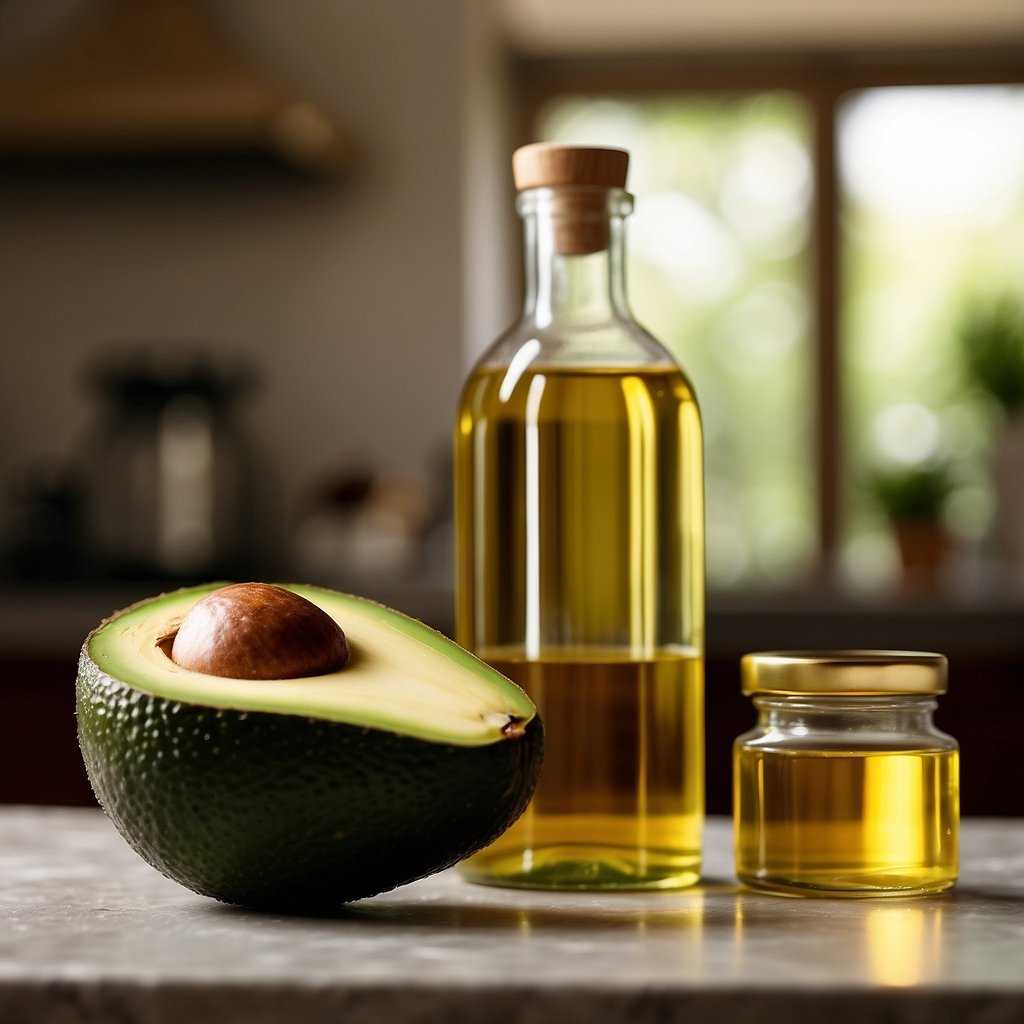
Nutrient Comparison
Hey, curious cat owners! Have you ever pondered whether to add avocado oil or whole fruit to your kitty’s diet?
Let’s break it down. Avocado oil is a nutrient-dense elixir, boasting high levels of healthy fats like oleic acid, which can shine up your cat’s coat.
It’s also rich in vitamin E, potassium, lecithin, dietary fiber, weight loss, and fiber. On the flip side, whole avocados serve up more fiber and contain additional nutrients like vitamin C, folate, and more potassium. (8)
However, it’s important to note that cats, as obligate carnivores, have particular nutritional needs that can only be met with meat and fish, not a vegan diet.
Avocado Oil:
- High in oleic acid
- Vitamin E
- Potassium
- Lecithin
Whole Avocado:
- Additional fiber
- Vitamin C
- More potassium
- Folate
When it comes to your cat’s health, the purity of avocado oil can be preferable as it typically has lower levels of persin, a substance that can be harmful to pets.
This makes the oil, in small quantities, a safer bet compared to the whole fruit.
Safety Concerns with Whole Avocado
Speaking of persin, it’s found more abundantly in the leaves, skin, pit, and the fruit of the avocado. It’s like nature’s no-no for cats.
When it comes to avocado oil, the manufacturing process significantly reduces the persin level, making it a gentler option for your feline friend.
Still, it’s always best to chat with your vet before introducing new foods like raw meat or peanut butter.
They know your pet’s unique needs like the back of their hand and can give you personalized advice for your furry companion.
Keep in mind; that moderation is key. A little peanut butter can go a long way for your cat’s health and shine!
Quick Recap
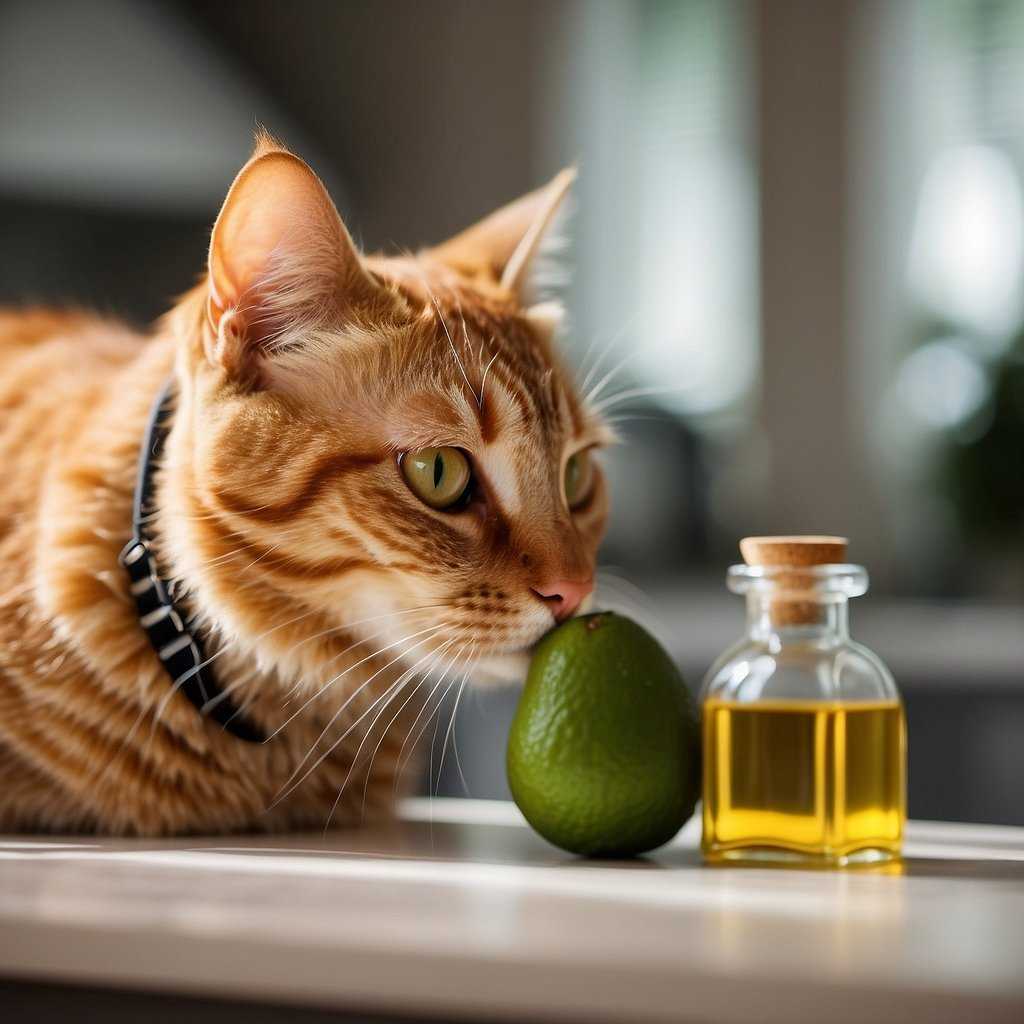
Hey there, fellow cat lover! Ever caught yourself wondering if that shiny bottle of avocado oil is okay for your kitty? You’re not the only one. Here’s the lowdown on this trendy topic:
- Avocado Oil: Generally, for us humans, avocado oil is a health wizard. But for our feline friends, the situation is a bit more complex.
- Nutrition: Avocado is densely packed with nutrients, and it’s tempting to share the goodness with your cat.
- Toxicity Concerns: A red flag for cats is persin, a substance found in avocados that can be harmful to some animals. Thankfully, the oil contains less persin than other parts of the fruit, but the risk isn’t zero.
So, the big question:
- Can cats eat avocado oil? In moderation, it might be safe for some cats, but the consensus isn’t unanimous.
| Avocado Part | Safe for Cats? | Note |
| Flesh | Maybe | Low in persin; still be cautious |
| Pit | No | High in persin; potential choking hazard |
| Leaf | No | Contains persin; toxic |
| Oil | Maybe | Least persin; consult your vet |
Remember, every cat is unique and what’s fine for one might not be for another.
Before you consider sharing:
- Chat with your vet. They know your cat’s health history and can give tailored advice, so keep in touch with them to understand your cat’s nutritional needs.
- Portion Control. Even if it’s a green light, too much of a good thing is a real concern.
No number crunching or case studies to report here, but keep these tidbits in mind. You want the best for your furry companion, and it’s awesome that you’re diving into the details. Keep up the great work!
And a little tip from one pet parent to another—when in doubt, choose cat-specific treats. They’re made just for your feline and can prevent any possible mishap.
Plus, your cat probably won’t notice the difference, but their health sure will!
Frequently Asked Questions
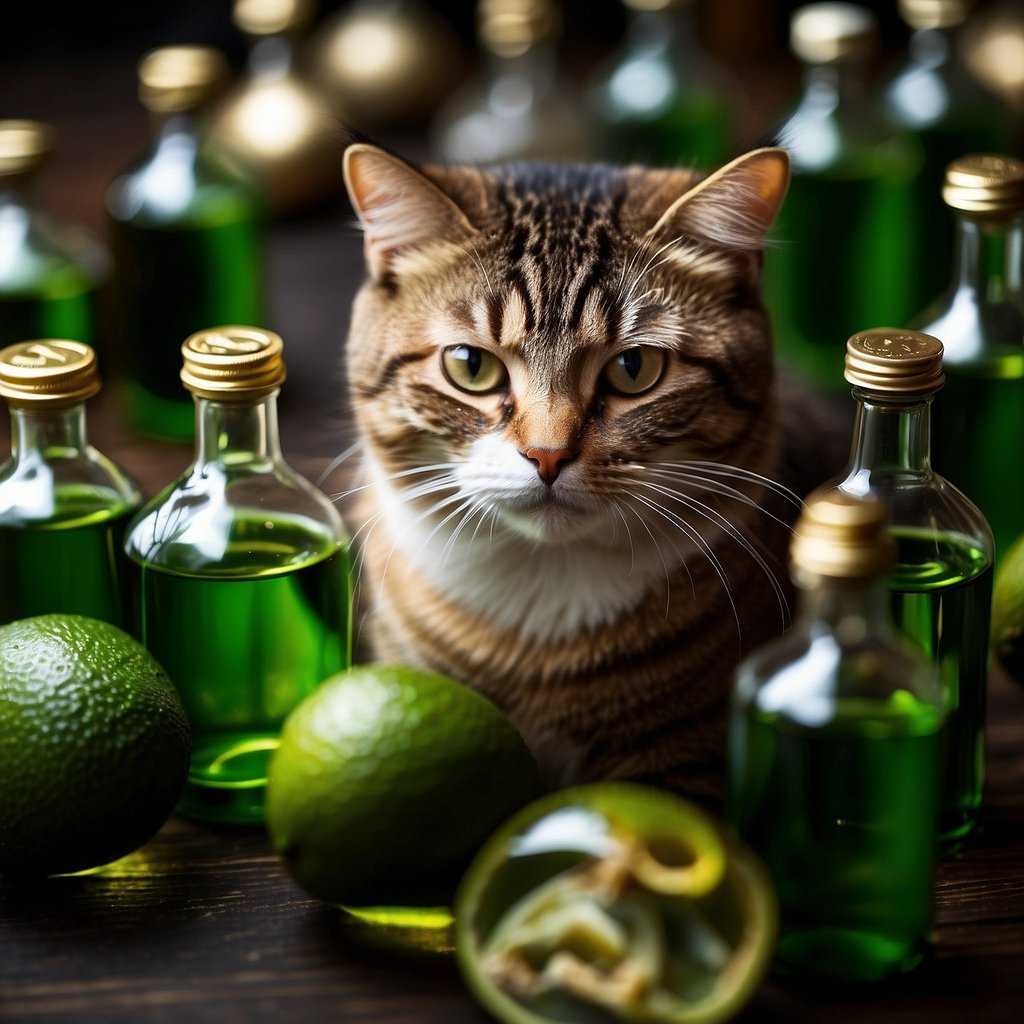
Navigating the nuances of your cat’s diet can be tricky, and you may be curious about the role of avocado oil. Let’s address some of the common questions that might be on your mind.
Can avocado oil improve my cat’s coat condition?
Avocado oil is known for being rich in vitamins and fatty acids, which may contribute to a shinier and healthier coat in cats.
However, it’s always best to consult with your vet before adding it to your furry friend’s diet.
Is avocado oil safe for kittens?
Kittens have delicate digestive systems, so it’s crucial to be cautious.
While small amounts of avocado oil might not be harmful, always get a veterinarian’s approval before introducing any new supplement into a kitten’s diet.
Can avocado oil help with my cat’s digestion?
Some believe that the monounsaturated fats in avocado oil can aid digestion in cats. Yet, every cat is different and what works for one might not suit another.
Always observe your cat’s response and speak with a vet if you’re considering it for digestive issues.
Are there any breed-specific considerations when feeding avocado oil to cats?
There are no known breed-specific responses to avocado oil in cats, but individual sensitivities can vary.
Keep an eye on your cat’s reaction if you decide to try it, and consult with a vet for personalized advice.
Is it possible for a cat to overdose on avocado oil?
As with any supplement, moderation is key. Too much avocado oil could lead to an upset stomach or more serious health issues.
Stick to veterinarian-recommended doses to avoid any negative effects.
Are there any alternatives to avocado oil that are safer for cats?
For those who prefer to err on the side of caution, there are safer alternatives to avocado oil.
Omega-3 fatty acids found in fish oils are widely recognized as beneficial and are typically considered a safer option for cats.
- Neteller Live Casino Sites: The Ultimate Overview - July 23, 2025
- The Ultimate Overview to Free Gambling Enterprise Slots - July 23, 2025
- Online Casino Sites Mastercard Accepted: A Safe and Convenient Choice for Bettors - July 23, 2025

